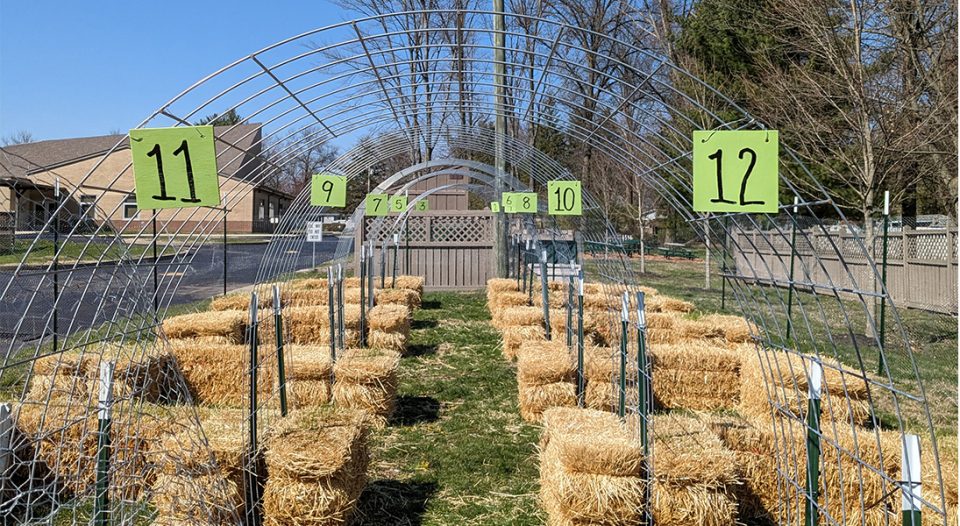Prince of Peace Lutheran in Loveland, Ohio, is growing more than cucumbers, tomatoes and peppers in its community garden on the church grounds.
The congregation—along with the 22 families who tend the garden—is sowing seeds and growing relationships with the community. The garden provides a portion of its harvest to help those in need at the local food pantry, nurturing a reputation as a church that cares about its neighborhood.
“This garden has definitely been a reminder of the importance of being engaged in the wider community,” said Jonathan Eilert, pastor of Prince of Peace. “It’s easy to be insular, so we need to have intentional, outwardly focused programs. It’s good to engage with our neighbors and the community.”
Though a congregation with a community garden is nothing new, Prince of Peace’s approach to planting and managing the garden is innovative. Plants grow not in the ground but in 18-by-36-by-14-inch straw bales hung 18 inches off the ground.
Toby Lyke, director of music and worship at Prince of Peace and staff liaison to the garden, said straw-bale gardening can be done anywhere and requires no preparation or tilling. Since the straw bales are suspended, they require less weeding or bending over in general. When the plants are established, the bales require less water and maintenance than a traditional garden does. “Once the straw decomposes, the plants get their energy from the straw,” he added.
Every gardener donates 10% of their produce to the food pantry. Church member and garden enthusiast Sheryl Melvin estimates that the pantry gets about 30 pounds each week. The garden is so successful that it has a waiting list for next spring, and the church is considering how to add to its current 110 bales.
“We’re finding that people are hungry to garden, both financially and for healthy food,” said Melvin, who took up straw-bale gardening in her retirement and suggested the idea to the church last year. “Initially I thought it was about the produce. But then I realized it’s about building relationships. Everyone is hungry for friendship. We’re making friends in the garden. It fosters the community aspect of the church.”
Eilert said the idea has worked well because straw-bale gardens aren’t as labor-intensive as other projects. “It’s been a real gift,” he said. “It’s minimal staff effort. Often projects end up being so much weight on the staff. But with this, we have very inspired laypeople working on it.”
Last year Melvin and Lyke planted a demonstration garden of 10 bales as a test. After it proved successful, they sold the congregation and community on the project last spring. The church buys straw bales from a local farm for $6 each. Gardeners provide only the plants and seeds and are responsible for maintaining their bales. Participants are often seen helping each other.
Plants include corn, carrots, potatoes, tomatoes, squash, pumpkins, peppers, eggplant, lettuce, kale, strawberries and more. “There’s very little you can’t grow in straw,” Lyke said. A gallon of water is enough to soak a bale, which also has great drainage.
He called it a “zero-waste initiative” because the bales are composted at the end of the season.
Lyke and Melvin especially like the sense of community and ecumenical spirit that the garden inspires. “We’re just living and loving like Jesus, and it’s transformative,” Lyke said.
“Someone was having trouble with fungus on their cucumber plants,” he added. “I was helping with that, and it was a great conversation starter. The gardener, who was from the community, said she didn’t like the church at large because she had a lot of bad experiences. But, she added, ‘I like Prince of Peace.’”
Melvin has taught workshops on straw-bale gardening for new participants and fielded questions from a local Catholic church and Methodist food pantry that had heard about the garden. “I’ve even talked to a pastor in Seattle about it,” she added.
The congregation is exploring the possibility of expanding the garden to other locations in the community, including low-income housing complexes.
Melvin’s advice for congregations that want to start a straw-bale garden: “Be willing to take a risk. Get familiar with straw-bale books and websites. Gardening is always an experiment. Give it a try and reflect in the fall about what worked and what didn’t.”





